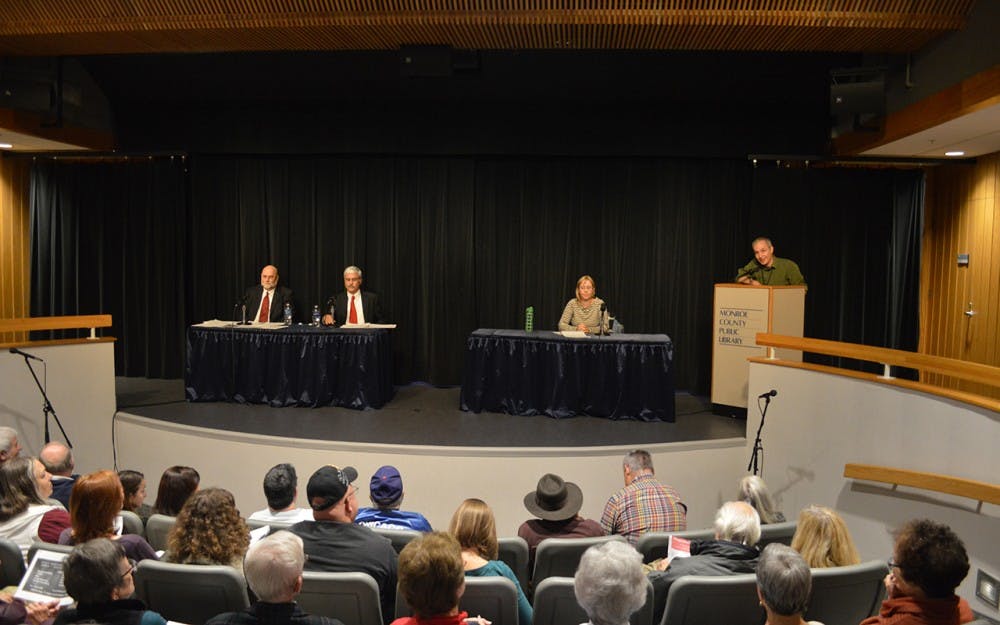More than 100 people, old and young, walked into the Monroe County Public Library auditorium Wednesday night to discuss their concerns with bringing refugee families into Bloomington.
“Refugee resettlement is not what people think it is,” investigative journalist James Simpson said.
The forum was organized after Exodus Refugee Immigration Inc., an refugee-resettlement group working with the federal government, had decided to open an office in Bloomington. Exodus plans to move 20 refugee families to Bloomington with the possibility of more refugees to come later.
Robert Hall, the leader of the Grassroots Conservatives in Bloomington, and Diane Legomsky, the leader of the Bloomington Refugee Support Network, helped organize the event. The two groups have engaged in several debates in the last few months, and several events have mandated a police presence. Hall said he believed the forum helped foster a more civil discussion than before.
Simpson joined Don Barnett, a fellow at the Center for Immigration Studies, and Christie Popp, an immigration lawyer, as members of a panel designed to answer questions and address misconceptions.
Simpson said he has been looking at the refugee issue since the 1980s, and refugee resettlement has changed through the years.
“It has become an increasingly big business,” Simpson said.
Refugee-resettlement programs take $3 billion from the federal government, Simpson said.
Barnett agreed and said the program is not only misunderstood, but it is confused with myths and misinformation which can distort the issue.
“The program is held aloft by myths,” Barnett said.
The program places fiscal burdens upon the individual states and the numbers of refugees is determined by the president of the United States each year, Barnett said.
“The U.S. has always been a welcome place to refugees,” Barnett said. “Make no mistake of that.”
One of the other concerns brought by those at the forum was the question of vetting refugees and how to integrate them into the U.S.
Popp said while the fear of terrorism is a legitimate fear, people cannot let fear stop them from helping others.
She said the refugee situation in the U.S.is different from that in Europe and in particular in Paris. Following the Paris terrorist attacks in 2015, a number of states had concerns on accepting refugees.
Popp said these are not the same situation are at all. Popp also said there is a further moral and historical obligation placed on the U.S. to accept refugees.
“We have a moral obligation,” Popp said. “Let’s not forget World War II.”
During WWII, a number of Jewish refugees were denied entry to the United States and were sent back to Europe. Popp said this was not something she would want to see happen again.
“It’s up to us as a community to come together and help the refugees,” Popp said.
Panelists, given two minutes each, also worked to answer the question of what responsibilities Americans have to refugees.
Simpson said the U.S. should take responsibility for many of the hardships in the Middle East but also said the country cannot and should not accept so many refugees.
Popp said she agreed but argued with Simpson on where U.S. responsibility ends. She said citizens do have a responsibility to help and she is proud to help.
“I think it’s great we help so many people,” Popp said. “This is our mess we created in the Middle East.”
Simpson said he has no problem helping people around the world but the refugee resettlement programs have become more about making money than helping people.
While each panelist and each person at the event had their own arguments and views, Popp said no one is a bad person. Everyone wants to help in someway and people are coming at the issue from different angles, Popp said.
“We all just want to make sure we’re doing the right thing,” Popp said.




